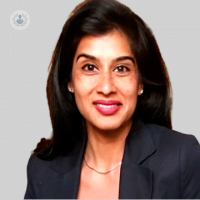Endometriosis: An expert answers your questions
Written by:Endometriosis is a common condition, affecting about 1 in 10 women. In her latest online article, leading consultant obstetrician and gynaecologist Dr Tilottama Nandy answers your burning questions about this condition.

How is endometriosis defined?
Endometriosis is a process where the lining that is ordinarily present only on the inside of the womb (i.e. the endometrium), is deposited in other places outside of the womb cavity. These other places might include other pelvic surfaces and organs, including the ovaries, bowel and bladder, or rarely, in more distant places such as the lungs.
What are the first signs of endometriosis?
The first signs of endometriosis can be quite variable. The classic symptoms are painful periods, bleeding in between periods, painful sex and sometimes after sex, pelvic pain and bloating.
Sometimes, it is completely asymptomatic and detected as an incidental finding, occasionally during other investigations. It can lend itself to fertility issues. The symptoms are non-linear, meaning that little endometriosis can cause a lot of pain, and conversely, significant endometriosis may sometimes not cause much or any disturbance.
Who is at risk of developing endometriosis?
Having a first-degree female relative with endometriosis increases a woman’s risk of developing the disease.
Early age of onset of menstruation, late menopause, heavy periods, prolonged periods, nulliparity, and short intervals between menstrual cycles, may all contribute to the risk of endometriosis development. It can also be triggered whilst using HRT. It affects 1 in 10 women.
What are the main treatment options for endometriosis?
Symptoms related to pain may be treated with analgesia, but this will not affect the actual disease process in itself. To tackle the disease, hormonal therapies are necessary, in the form of the hormonal pill, Mirena coil, or injections at intervals.
Surgical options include burning superficial disease, or excising (cutting away) cysts or deeper implants. The process of endometriosis is responsive to our hormones, and controlling the effects of the disease can be difficult and frustrating. It tends to become quiescent in menopause when endogenous oestrogen production ceases, but women who use HRT may stimulate background endometriosis.
How is endometriosis linked to infertility?
Endometriosis can cause adhesions that affect the fallopian tubes. Fertility may also be affected by general pelvic inflammation, and ovarian reserve and/or egg quality may also be diminished.
The effect on the endometrium itself can interfere with successful implantation owing to inflammatory and/or immune factors. Not all women with endometriosis will have problems with fertility, but once diagnosed, it is useful to be informed of potential delays or difficulties with natural conception.
If you would like to book a consultation with Dr Tilottama Nandy, you can do so today via her Top Doctors profile.


